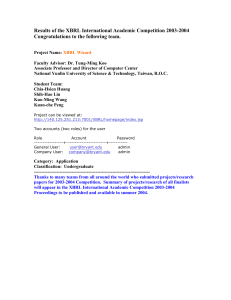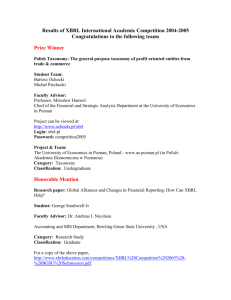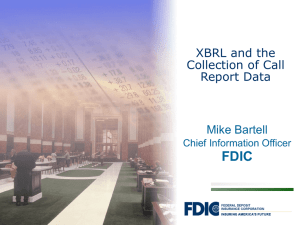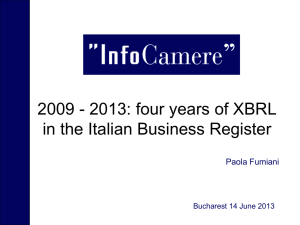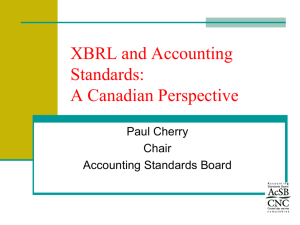What is XBRL XBRL (eXtensible Business Reporting Language) is a
advertisement
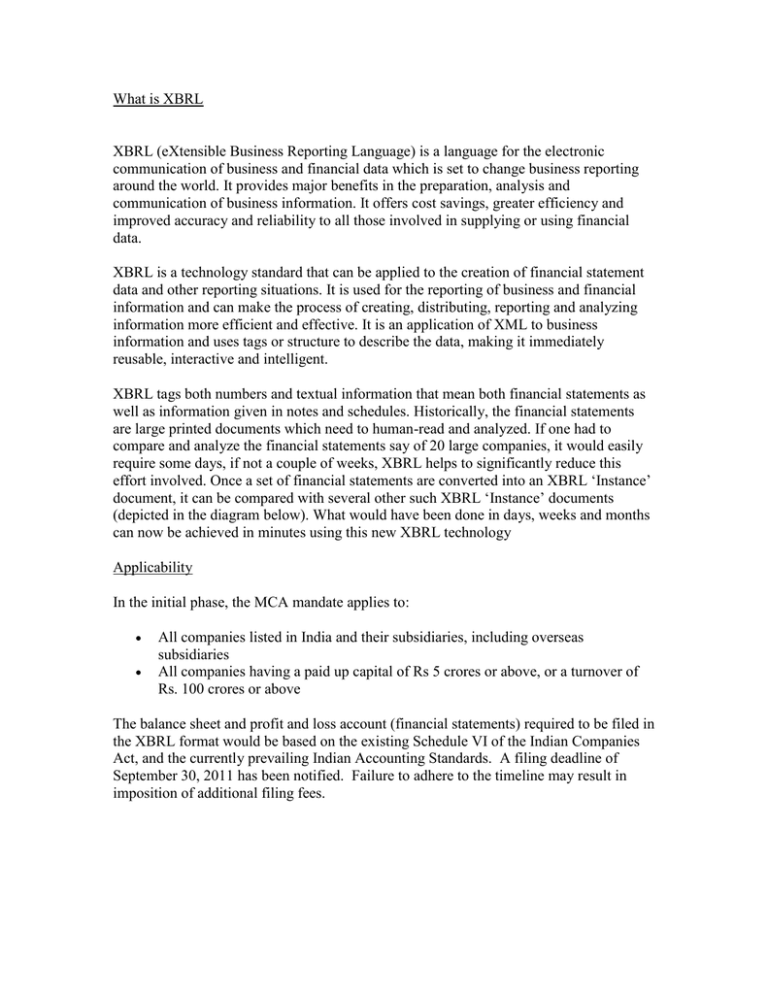
What is XBRL XBRL (eXtensible Business Reporting Language) is a language for the electronic communication of business and financial data which is set to change business reporting around the world. It provides major benefits in the preparation, analysis and communication of business information. It offers cost savings, greater efficiency and improved accuracy and reliability to all those involved in supplying or using financial data. XBRL is a technology standard that can be applied to the creation of financial statement data and other reporting situations. It is used for the reporting of business and financial information and can make the process of creating, distributing, reporting and analyzing information more efficient and effective. It is an application of XML to business information and uses tags or structure to describe the data, making it immediately reusable, interactive and intelligent. XBRL tags both numbers and textual information that mean both financial statements as well as information given in notes and schedules. Historically, the financial statements are large printed documents which need to human-read and analyzed. If one had to compare and analyze the financial statements say of 20 large companies, it would easily require some days, if not a couple of weeks, XBRL helps to significantly reduce this effort involved. Once a set of financial statements are converted into an XBRL ‘Instance’ document, it can be compared with several other such XBRL ‘Instance’ documents (depicted in the diagram below). What would have been done in days, weeks and months can now be achieved in minutes using this new XBRL technology Applicability In the initial phase, the MCA mandate applies to: All companies listed in India and their subsidiaries, including overseas subsidiaries All companies having a paid up capital of Rs 5 crores or above, or a turnover of Rs. 100 crores or above The balance sheet and profit and loss account (financial statements) required to be filed in the XBRL format would be based on the existing Schedule VI of the Indian Companies Act, and the currently prevailing Indian Accounting Standards. A filing deadline of September 30, 2011 has been notified. Failure to adhere to the timeline may result in imposition of additional filing fees. What are the potential uses of XBRL XBRL can be applied to a very wide range of business and financial data. Among other things, it can handle: Company internal and external financial reporting. Business reporting to all types of regulators, including tax and financial authorities, central banks and governments. Filing of loan reports and applications; credit risk assessments. Exchange of information between government departments or between other institutions, such as central banks. Authorative accounting literature - providing a standard way of describing accounting documents provided by authoritative bodies. A wide range of other financial and statistical data which needs to be stored exchanged and analyzed. Who can be benefited from using XBRL. All types of organisations can use XBRL to save costs and improve efficiency in handling business and financial information. Because XBRL is extensible and flexible, it can be adapted to a wide variety of different requirements. All participants in the financial information supply chain can benefit, whether they are preparers, transmitters or users of business data. What are the benefits to a company from putting its financial statements into XBRL XBRL increases the usability of financial statement information. The need to re-key financial data for analytical and other purposes can be eliminated. By presenting its statements in XBRL, a company can benefit investors and raise its profile. It will also meet the requirements of regulators, lenders and others consumers of financial information, who are increasingly demanding reporting in XBRL. This will improve business relations and lead to a range of benefits. With full adoption of XBRL, companies can automate data collection. For example, data from different company divisions with different accounting systems can be assembled quickly, cheaply and efficiently. Once data is gathered in XBRL, different types of reports using varying subsets of the data can be produced with minimum effort. A company finance division, for example, could quickly and reliably generate internal management reports, financial statements for publication, tax and other regulatory filings, as well as credit reports for lenders. Not only can data handling be automated, removing time-consuming, error-prone processes, but the data can be checked by software for accuracy. How do companies create statements in XBRL There are a number of ways to create financial statements in XBRL: XBRL-aware accounting software products are becoming available which will support the export of data in XBRL form. These tools allow users to map charts of accounts and other structures to XBRL tags. Statements can be mapped into XBRL using XBRL software tools designed for this purpose. Data from accounting databases can be extracted in XBRL format. It is not strictly necessary for an accounting software vendor to use XBRL; third party products can achieve the transformation of the data to XBRL. Applications can transform data in particular formats into XBRL. For example, web sites are in operation which transforms EDGAR filings in the United States into XBRL, providing more efficient access to specific data in the filings. XBRL benefits go beyond financial statements XBRL permits the automatic exchange and reliable extraction of financial information across all software formats and technologies, including the Internet. It enhances efficiency by allowing tagged financial information to be transmitted in many formats and deployed with various analytical tools. This efficiency is a potential source of reduced costs. In addition to financial information, even non-financial information like vendor data, customer data, project information, etc can be tagged so that it can be extracted and analyses automatically. XBRL can benefit preparers, users, and regulatory agencies. Depending on the extent of the use of XBRL, preparers could benefit from lowered costs to produce information, more timely, accurate analyses of data needed to make decisions, and enhanced analytical capabilities. Users could benefit from reduced costs to obtain needed financial information, facilitated analytical processes, and more accurate analyses. Users of transnational data can benefit from the relative ease with which the data can be translated, for example, by changing a data label from English to German or Japanese, and from easier access to definitions that enhance comparability, for example, by reading the description within the tag. Regulators can benefit from simplified programming, facilitated validation, greater flexibility in getting changes made to submissions, and more timely, accurate, and consistent data for analysis and research. Challenges for Indian corporate Companies need to quickly gear up to and benefit from this new reporting challenge. Some of the key challenges that companies might encounter as they adopt XBRL reporting are: Requirement of training staff The software tool to be used for the purpose of tagging the financials The first-time efforts for tagging the financial statement data correctly to the relevant taxonomies Smooth and timely closure of reporting within the prescribed timeline Ability to fully leverage XBRL, beyond regulatory compliance Global acceptance of XBRL Countries like China, Israel, Japan, United States, Singapore, Korea, Italy and Belgium have already mandated XBRL based filing of financial statements. For example, the United States has already mandated XBRL-based filing for all listed companies, in a time bound manner. In India, in addition to the MCA Circular discussed above, other regulators like the Reserve Bank of India already require specific information in an XBRL-compliant format. The Securities and Exchange Board of India has also announced an ambitious project titled SUPER-D that will enable XBRL-compliant data to be captured, analyzed and made available publicly. Several other regulators are expected to mandate XBRLcompliant filing of information, which would then be analyzed and disseminated. XBRL is an information revolution that can benefit all of us Future of XBRL XBRL is set to become the standard way of recording, storing and transmitting business financial information. It is capable of use throughout the world, whatever the language of the country concerned, for a wide variety of business purposes. It will deliver major cost savings and gains in efficiency, improving processes in companies, governments and other organisations. ……….The End………..
